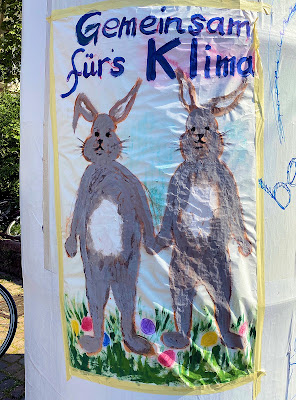Corona Selfies
A good friend of mine, Professor Brigitte X., donated me three paper masks. Contrary to the famous check, they were in the mail on Wednesday. Wearing them gives me a better feeling when I am in crowded places, i.e., supermarkets (I limit shopping to three times a week), streetcars (although they are mostly empty these days), and the Minster market (I visited today).
These welcome masks are a reason to take my first and only selfies in four configurations:
The selfie shows drawings in the background my grandchildren made when they still had one-digit birthdays.
The intellectual selfie I took in my study.
The selfie on my covered outside terrace with the onset of the Black Forest in the back.
The empty streetcar selfie shows that shooting the previous selfies stressed my mask.
Hydroxychloroquine
If we cannot get a vaccine against SARS-CoV-2 within a year, maybe a medication against Covid-19 will be available soon? Laboratories worldwide are testing existing drugs for their efficacy against the new Coronavirus.
One of the hopeful candidates is hydroxychloroquine, a medication for preventing and treating malaria. Red Baron found out that this compound is an over-the-counter drug; even worse, it can be ordered online.
Plaquenil has severe side effects. Since March 27, 54 cases of heart problems have been diagnosed in France among self-medicated people, of which seven ended fatally. Three persons were saved by applying electric shocks.
The pressure is great to return to "normal" life, particularly for people losing their jobs, but whether hydroxychloroquine is the drug to fight Covid-19 effectively still has to be proven. The first results are not at all encouraging.
Cheated
Small businesses in the state of North Rhine-Westphalia experiencing financial difficulties due to the present lockdown were able to apply online for instant cash flow money. Those applicants were unwittingly guided to fraudulent websites. They entered their credentials into a form and then waited for the much-needed capital to arrive fast.
The crooks phished the data and entered them into the official forms of the state. With this simple trick, they diverted taxpayers' money to their accounts while owners of small businesses waited in vain for their cash. Nothing is yet known about the financial damage, but for now, North Rhine-Westphalia has simply shut down the possibility of applying for fast financial help online.
Heinsberg
The first significant spread of the Covid-19 pandemic in Germany was observed in the administrative district of Heinsberg, located in the state of North Rhine-Westphalia near the Dutch border. The outbreak was presumably started by an unknowingly infected couple who attended a carnival session with about 300 participants in the small community of Gangelt (12,000 inhabitants) on February 15, 2020. On February 25, the couple tested positive, but it was too late. By the end of March, nearly 1500 people had been infected with SARS-CoV-2 in the district of Heinsberg.
At the end of March 2020, scientists under the direction of the virologist Hendrik Streeck of Bonn University started a COVID-19 study at Gangelt. This study is supposed to provide recommendations for dealing with the coronavirus pandemic. The approximately 1000 participants are expected to provide representative data about the spread of the SARS-CoV-2 virus and the number of those actually ill.
According to a preliminary evaluation published on April 9, about 15% of the residents examined in the municipality of Gangelt were infected with the Coronavirus. They are now immune. If 15% of the population consists of resistant people, the speed of a further spread of Sars-CoV-2 is reduced accordingly. The mortality rate in the investigated area, measured by the number of people infected in total, was 0.37%, while the mortality rate in Germany as a whole is around 2%.
Professor Streeck concluded, "Based on these (interim) results, the strict requirements to contain the epidemic could be gradually eased, provided that hygiene and other behavioral measures were continued and are followed."
The study and the presentation of the preliminary results were subsequently criticized. Streeck and his team should have taken more time to evaluate before communicating the results. The specificity of the antibody tests is questioned, so the number of infected persons is dubious.
The media jumped on the results, taking the Durchseuchung (level of endemic infection) of 15% to call for an immediate loosening of the protective measures that are in place. Reputable virologists say that the magic figure for herd immunity in the case of SARS-CoV-2 is at least 70%.
A Grim Outlook
 |
| Epidemic hotspots around the globe on April 11 (Click to enlarge). |
 |
| The doubling time for infections is a dynamic parameter for pandemics. The harsh quarantine measures in Italy are bearing fruit. |
Andrew Sullivan wrote in New York magazine, "For one thing, the virus will be getting hold in East Asia and Africa, and thus we'll have a route back from those places to places that have already 'flattened the curve.' Will people still be afraid if we open up businesses, go around in masks, and avoid other people? Will we have musical events and sports? I doubt it."
And still, Andrew Sullivan did not mention the sufferings that lie ahead for the populations of those developing countries where people frequently live in slums and close communities. Here the virus finds highly vulnerable prey.
Developing countries do not have the medical infrastructure that industrial countries can mobilize. Starting with 28,000 beds for intensive care at the beginning of the pandemic, Germany now has about 40,000, of which 30,000 are equipped with respirators. Presently only 2000 of those beds are occupied by Covid-19 patients.
Not to Be Forgotten
The other challenge still lingering is climate change.
 |
| Together for the climate |
*







No comments:
Post a Comment